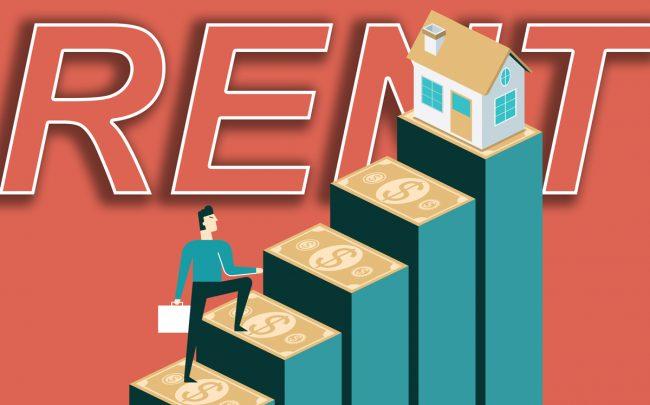Rental Prices Climbing
Triggering terms are basically claims or assertions made within the advertisement about a particular loan product, interest rate, down payment, or other enticing features that may lure a consumer to apply to that company instead of another when those products are not available to all that apply. An example of this would be an advertisement that says “0% Down”. While it is true that lenders have mortgage loan programs that are available, those programs might have income limitations, or in the case of Veterans Administration (VA) loans, the consumer must have served in the armed forces and discharged honorably. Another example is promising a lower down payment that is dependent on a loan program, such as HomeReady or HomePossible. With these loan programs there is a limit to how much household income the applicant can have to qualify. So advertising a 3% Down Payment entices a consumer to apply, but once they do, they are told that they need to supply a 5% down payment because their household makes too much money.

Renting a Home
For many of those that are reluctant to purchase a house right now, they are renting their home, apartment, or condo. According to News4Jax, a local news station, the price of renting a place to live increased by 30% in 2021. Where you could find a place to live for $1000/month a year ago, the same place is now renting for $1300. The expectation is to see more rise within 2022 before the economy stabilizes. Tenants that are in leases are seeing their rent increases as they renew their lease - and the increase is typically hundreds of dollars. For families that are already struggling, this could leave the potential of homelessness.
Purchasing a Home
As many have witnessed over the last year, the cost to buy has increased significantly. According to Forbes and Zillow, the cost of home ownership has increased by 20% in 2021, and is expected to climb another 20% in 2022. This means for a house that sold for $200,000 a year ago is now being sold for $240,000. For those that own a house during that time, it is great, you see a 20% increase in your investment. But for those that did not, there is a lot of wonder to where the housing market will be in another year.
Rental vs Buying Your Home
There are many benefits to purchasing a home instead of renting. Aside from the advantage of not having to move frequently as leases expire, and more freedom in making modifications to your home, home ownership comes with the advantage of paying yourself instead of others. When you pay rent, that money is considered gone as soon as it is paid. You can think of it as a service. You are paying a service to maintain a roof over you and your family’s head each month. Home buying allows you to pay yourself each month. As you pay your mortgage, everything you pay to principle is your money. Compound that with expected increase to property values and you will witness equity that can be accessed if you need it later.
To better illustrate this, let me give you a scenario. Let’s say you buy a house for $250,000 (seems out of reach for some but is far more realistic than you may think) at 3.75% on a 30-year fixed mortgage. The principle and interest payment would be $1,159.79. Of that, in the first year, roughly $380 each month will be a principle payment. As the months go by, more and more of your monthly payment goes to principle. If you are paying the same amount for rent, you would be paying yourself back that principle payment each month as equity in your home. Next lets take into consideration the expected increase in property value. As mentioned above, there is an expected increase of roughly 20%. If this same home that was purchase for $250,000 increases by 20%, that is an additional $50,000 of equity you would make simply for owning your home.
Granted these figures do not include property tax or home owners insurance, which vary depending on your home and where it is located, and too difficult to include in a post such as this. But for the sake of argument, if you buy a home and the total payment including principle, interest, home owners insurance, property tax, and mortgage insurance (if applicable) is the same as you would be paying for rent, you will retain the principle payment, plus property value increases, as equity.
Finally, buying is more favorable than renting since you will pay for a set term and then be done paying. Whether you choose a 30-year or a 15-year mortgage (or we can even create custom terms like a 22-year), when you make your last payment, you own the house and will no longer need to make principle and interest payments on a loan. You will still need to make property tax and home owners insurance payments, but those are dramatically lower than your principle and interest payment. This could prove to be advantageous in your later years.
